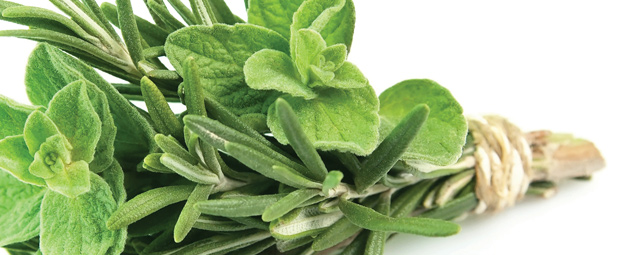Sustainability School
Nancy Amici and Jodi Curtis, Coopersburg neighbors, were in their first class—Basic Herbs—at the second-year Sustainability School. Curtis heard about its monthly hands-on back-to-nature classes and workshops through her sister, a neighbor of Teresa Kirk, one of the school’s co-founders. Amici followed Curtis’ lead.
“I’m surprised my sister kept it a secret for so long,” Curtis says. “I’m going to yell at her because now I missed the Raising Chicks class.”
Amici already grows several herbs and maintains a vegetable garden, but says all her herbs are common. She craved more information.
Curtis has a small garden, vegetables and one herb, oregano, but it’s failed “miserably” along with her potatoes and onions. “I’m trying,” she insists, explaining that she’s also begun raising backyard chickens. “We’re trying to become sustainable on our own property. We’re a one-income family, so I need to do as much as I can to make it easier. These classes cover almost everything I like.”
“I want to take the composting class and the canning classes,” says Amici, promising to return in the months ahead for a Basic Canning I class, Basic Canning II and a Yeast Breads workshop.
Kirk and Kristi Daly, the other co-founder, have a passion for sharing their knowledge and values for living simply and in harmony with nature. Sustainability is the capacity to endure, and so their classes center on living a self-sufficient and eco-friendly life. They’ve advertised and begun a Facebook site, and will soon exhibit at community days, fairs and kindred events. Word-of-mouth has carried them thus far. “People want to do this, but they don’t know how,” Daly says. “Our purpose is to help people learn that there’s a better way to live. You don’t have to buy your chicken at the store.”
Both come from farming backgrounds. Daly and her husband Joe were running a family farm in Rixeyville, Virginia until 15 years ago. They raised most of their own food, were backgrounding steers, growing hay and sweet corn, and had a huge garden, hogs, French Alpine dairy goats, chickens and a budding herd of brood cows before a job opportunity for Joe brought them to New Jersey.
Kirk’s parents had a small farm in central Illinois. When Kirk came east, it was to work in education at a living history farm, Howell Farm in New Jersey, where she met her husband, Stephen, in a corn maze. Soon after, they married and moved to Bethlehem.
Both Kirk and Daly were teaching others about sustainability informally, and independently, mentoring anyone who would listen. After they met through an online social network and traded roosters, The Sustainability School was born.
“Teresa is a born teacher,” says Daly, who is more business-minded.“We fill in each other’s gaps,” explains Kirk, who came to the realization that the teaching she was doing for home school groups and others “was worth something.” Certainly more than what they charge—$20 for a 90 minute lecture and hands-on class and $10 for a 60 minute hands-on workshop.
True to plan, at their Basic Herbs class in June, Kirk carried the lecture then Daly lead the class on a herb-tasting tour of her gardens, many of which are in terraced sections of dry-laid stone surrounds, all the while encouraging the newcomers to “find, investigate, discover and make” the herbs their own. Cleverly, she uses white canning lid inserts to label each patch of herbs. Many prefer well-drained soil, so the terracing helps. As for the stone, Daly admits she just “likes rocks.”
Both were wearing colorful aprons of flowers, berries and the like. Kirk had a pair of scissors in each back pocket of her jeans for snipping samples. There were seven students, including one man, who later admits that he’s a “plant.” He’s Kirk’s husband.
The best way to sample an herb is to rub a leaf between your fingers, then smell it or your fingers or taste your fingers. That’s exactly what the class has a chance to do, first with peppermint, then meadow mint, which is popular in Amish country, then mountain mint, which can be a bit skunky but has valuable medicinal qualities like many herbs. The Pennsylvania Dutch boil mountain mint in honey for use as cough drops. The class also samples spearmint, and even a bronze fennel, which tastes like licorice.
On her tour, Daly covered Lemon balm, a garnish, but it’s also great on an insect bite, sweet herb, a sweetener strong enough to give you sugar shock, aloe, Cleopatra’s beauty secret, also angelica, dill, oregano, chives, sage, which grows like a shrub, and even comfrey, which if nothing else is good for putting nutrients back into her compost pile.
Daly says it’s imperative to buy herb books or manuals or to do some online research. “It’s a commitment,” she says. “You need to think where you’re going to put them. You need to know what they like, and what it takes, so that you make the commitment or decide not to bother.”
Gardeners will cut back herb growth all summer, but for harvest, it’s best to pick herbs in the morning when they are most potent, but after the dew evaporates. This helps eliminate any added moisture when you initiate the drying, whether by hanging herbs in bunches, or clamping them between two box window screens or placing them on a cookie sheet in an oven.
Sustainability minimizing your carbon footprint—is at the heart of their message in every class. Plus, they say there’s a spiritual side to working with nature.
At the end of the Basic Herbs class, there’s fun stuff—and free stuff—plus $1 starter herbs. They give away horseradish roots, and also a sample of mint tea sweetened with stevia, yet another herb.
Classes are held at a variety of locations in and around Quakertown. For more information visit facebook.com/SustainabilitySchool.





